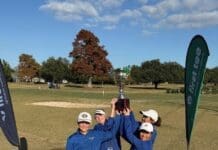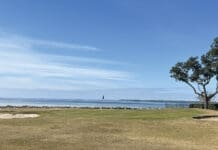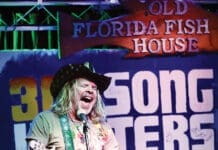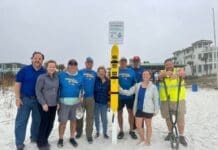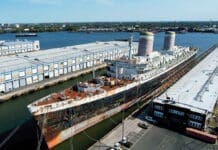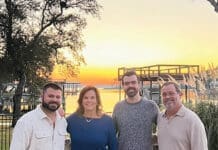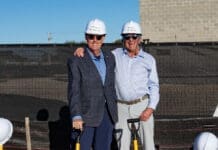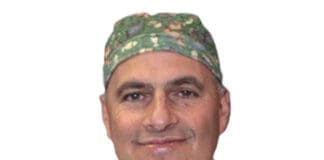By Doug Stauffer
In a ceremony rich with tradition, Brig. Gen. Mark A. Massaro assumed command of the 96th Test Wing from Brig. Gen. Jeffrey T. Geraghty on July 3, 2024. Despite the rainy weather outside, the McKinley Climatic Laboratory provided a perfectly climate-controlled environment for the event, which was presided over by Maj. Gen. Evan C. Dertien, Air Force Test Center commander. “I’m so happy to return to Eglin,” Massaro expressed in his remarks. “While it’s fantastic to return as a previous member of the test wing, and it’s comforting to be back as a Florida native, even in July, what causes me to smile the most is getting to contribute to this mission again.”

Brig. Gen. Massaro, a seasoned command pilot with over 2,200 combat hours, began his test pilot career in 2007 with Eglin’s 40th Flight Test Squadron. His extensive experience includes deployments supporting Allied Force, Southern Watch, Iraqi Freedom, and Enduring Freedom operations. As the new commander, he leads over 10,000 military personnel, civilians, and contractors. The wing is responsible for the developmental testing and evaluation of conventional munitions, command and control systems, aircraft avionics and guidance systems, and radar cross-section measurements. Additionally, Massaro will oversee a 120,000 square mile over-water test range and facilities in six states and all base operating support, infrastructure and services support for Eglin.
Maj. Gen. Dertien highlighted the significance of Eglin Air Force Base and its role in developing joint capabilities to support national objectives. “Eglin is on the leading edge of forging new technologies into fielded capabilities and supporting a diverse array of joint activities,” Dertien said.
Brig. Gen. Massaro’s extensive background includes commanding the 412 Operations Support Squadron and the 495th Fighter Group. He has flown over 100 combat hours in the F-16, commanded a classified assignment and served as the 495th Operations Group commander at Shaw Air Force Base, South Carolina.
In his first address as commander, Massaro emphasized his excitement about returning to Eglin after 15 years. “I’m humbled to be here today as the commander of the 96th Test Wing,” he said. Massaro outlined his priorities: executing the mission, caring for people, and partnering for success. He emphasized the wing’s role in advancing the Air Force’s operational imperatives, including strengthening the nation’s air-delivered arsenal, enhancing navigation and guidance systems, and developing joint all-domain command and control systems.
Massaro also stressed the importance of partnerships within Team Eglin and with the local community. “I am committed to continuing the strong relationships that have been built up over these past years as we partner for success,” he said.
The ceremony included several traditional elements, such as the passing of the unit guidon to symbolize the transfer of command. The 96th Test Wing Honor Guard presented the colors, and General Geraghty’s daughter sang the national anthem. An F-16 aircraft bearing Massaro’s name was unveiled as part of the welcome for the new commander.
As Brig. Gen. Massaro takes the helm, he brings a wealth of experience and a deep commitment to the mission and people of the 96th Test Wing. The change of command ceremony underscored the critical role of the wing in supporting national defense objectives. As the largest installation in the U.S. Air Force, Eglin Air Force Base hosts a complex mission set that includes weapons development, advanced spectrum warfare, and training for special operations forces and other specialized units.
The event concluded with the Air Force song, marking the official transfer of leadership. Brig. Gen. Massaro now leads the wing’s efforts in testing and evaluating systems critical to U.S. military capabilities in an era of great power competition.



